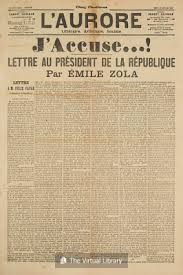Émile Zola (1840-1902)
J’Accuse (I Accuse)
France, January 13, 1898
Must Know
France, 13 January 1898.
An article published in the daily L’Aurore, in which novelist Émile Zola condemns the French army and government for their attitude toward Alfred Dreyfus.
Alfred Dreyfus was a Jewish army officer who was accused by the French army of treason for allegedly selling military secrets to the Germans during the Third French Republic.
The case was monumental as it generated a large public response about injustice, especially in a time of increased anti-Semitism in Europe. Zola’s letter in particular amplified a divide in France between those in favour of reopening the case and those against, who viewed this controversy as an attempt pf discrediting the French army. It is now known as the Dreyfus affair and marks the start of a new era for the Third French Republic, that of the formal separation of church and state in 1905.
The original newspaper extract is at the National Library of Israel in Jerusalem.
More Info
I accuse…! (In French:! … J’accuse), is a famous opinion piece by Emil Zola published in the French newspaper L’Aurore on January 13, 1898, in which he attacked with extraordinary sharpness the behavior of the French government and army towards Alfred Dreyfus. The article is in fact a public open letter addressed to French President Felix Four, accusing those involved in the trial of document forgery, biased investigation and miscarriage of justice. The article had strong influences on public opinion in France, and was one of the causes of a retrial that ultimately won Dreyfus. Following the article, Emile Zola was prosecuted and sentenced to one year in prison and fined, but the resurgence of the affair led to the sentencing of a retrial for Dreyfus, who eventually wins. he died at the age of 62, four years after an affair arose with the publication of his article “I Blame” and was apparently poisoned.
The phrase ‘I accuse …’ has become a language of protest against legal persecution. Such use was made in the Aryeh Deri case, an Israeli politician convicted of bribery and fraud in 1999. The film ‘I accuse’ which tell the tale of Deri’s case accuses the Israeli judiciary system of targeting Aryeh Deri based on orthodox religious and racist beliefs. Additionally, Moshe Katsav’s speeches regarding Deri’s case and the indictment against him draws inspiration from the famous phrase. he compared himself to Dreyfus which led to him being called”my speech I blame” in Israeli media.

